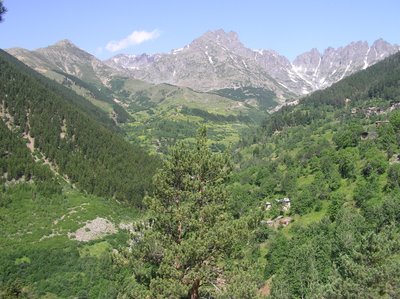 I awoke on the morning of June 26, 2006 in a Swiss-style chalet high in the Kackar Mountains of northeastern Turkey. I had left the Republic of Georgia 11 days earlier. This area of Turkey is known in the travel guidebooks as the Georgian Church country. The region was once part of Georgia, both ethnically and politically and a few ruined, soaring Georgian-style Orthodox churches from the 10th-12th century remain. Even so, they are quite a draw. I had hoped to visit four. While this appeared to be easily managable looking on the map, the reality of the mountainous terrain and twisting dirt roads defeated this goal. We managed to visit three, and by that time I was ready to come down out of the mountains.
I awoke on the morning of June 26, 2006 in a Swiss-style chalet high in the Kackar Mountains of northeastern Turkey. I had left the Republic of Georgia 11 days earlier. This area of Turkey is known in the travel guidebooks as the Georgian Church country. The region was once part of Georgia, both ethnically and politically and a few ruined, soaring Georgian-style Orthodox churches from the 10th-12th century remain. Even so, they are quite a draw. I had hoped to visit four. While this appeared to be easily managable looking on the map, the reality of the mountainous terrain and twisting dirt roads defeated this goal. We managed to visit three, and by that time I was ready to come down out of the mountains.Our pension was in Barhal, a small village wedged between the base of a mountain at the confluence of 2 rushing streams, 19 miles and 1 hour and 20 minutes up a torturous dirt road from Yusefeli. If you are looking to get away from it all, Barhal is a likely spot. A dolmus or two make the run up from Yusefeli, but the village doesn't see much traffic beyond that. My bed and board, including supper and breakfast cost $25. The only other tourists there consisted of a party of Swiss mountaineers. Incredibly fit, they all seemed about 6'2", wore hiking shorts and boots, and looked liked they could be extras from any old Nazi propaganda film. I had to wonder--if you are Swiss trying to decide where to go on holiday, wouldn't you rather go to the beach than the mountains?
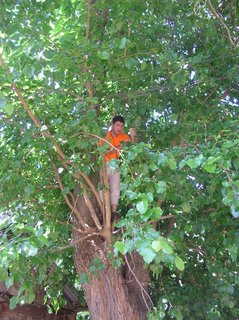 That morning, we drove up the trail past the village towards the Barhal church. Up until last year, it had served as a mosque and was currently closed pending restoration as a museum. The 10th or 11th century building was perhaps the best preserved of the three I visited, but the least prepossessing. This was due in part to it being wedged in on the side of a hill, with a grade school immediately adjacent, and trees closing in all around. There simply wasn't anywhere to stand back and get a perspective of the structure. I peered through the cracks in the doors--all the frescoes had received a thorough Islamic whitewashing years ago. It merely looked like a bland, deserted mosque. Before we left, my guide and friend, Turan, climbed a nearby mulberry tree and shook down plenty of delicious fruit for us.
That morning, we drove up the trail past the village towards the Barhal church. Up until last year, it had served as a mosque and was currently closed pending restoration as a museum. The 10th or 11th century building was perhaps the best preserved of the three I visited, but the least prepossessing. This was due in part to it being wedged in on the side of a hill, with a grade school immediately adjacent, and trees closing in all around. There simply wasn't anywhere to stand back and get a perspective of the structure. I peered through the cracks in the doors--all the frescoes had received a thorough Islamic whitewashing years ago. It merely looked like a bland, deserted mosque. Before we left, my guide and friend, Turan, climbed a nearby mulberry tree and shook down plenty of delicious fruit for us.Leaving Barhal church, we continued away from the village, further and further up the mountain valley. I kept thinking that we had reached the end of the road, but on and on it went, following close to a mountain stream. A single strand of electric wire paralleled the road and stream--sometime precariously--and sure enough, here and there, clumps of cottages and huts lay clustered along the hillsides. We passed 2 backpackers and stopped briefly to talk with them and give directions. They had a copy of a page out of the Lonely Planet guide, but were otherwise close to being quite lost. Turan was able to be of considerable assistance. We asked where they were from and they said "Chicago." They then seemed surprised to learn that I was an American as well. When we left, Turan assured me that they were not Americans, but Israelis trying to disguise their nationality. I tended to agree, they certainly did not seem American at all. Interesting, though. Later we passed a young woman herding a few head of cattle along the road. I'm afraid our vehicle scattered her charges. Eventually, our driver Belial, dropped Turan and I off at a bend in the road. We were to hike up and around the mountain and meet him at another crossing. Hiking the Kackars was a little more than I had bargained for.
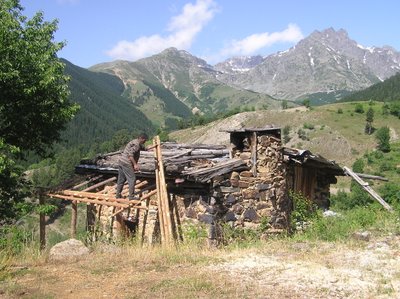 The steep climb certainly dispelled any lingering illusions about my youth and vitality. As we ascended, we found ourselves approaching a solitary cabin with unlimited vistas. A young woman worked the field in the foreground, as an adolescent boy performed chores around the house. The head of the family was on the roof, building a porch roof across one side of the cabin. He invited us to have tea. In short order the daughter of the household brought out a large wooden tray, the teapot, and the ubiquitous tulip-shaped glasses and sugar cubes for our tea break. We squatted on our haunches, drank the strong tea and smoked. Turan and the man talked at length. Later my friend was to relate the man's story to me. This was their home only during the spring and summer months. The snow forced them out during the winter. During those months, the family lived in an apartment in Yusefeli while the father would go to Istanbul to work as a day laborer. Theirs was a hard existence. He said the government was encouraging them to suppliment their income with activities such as beekeeping. This led to a story about "crazy honey." In some of the mountain valleys, the bees feed on the poppies that grow wild. Their honey is to be eaten with great moderation and in very limited qualities. The man had a friend who had helped trap a bear on the other side of the mountain. His payment was a spoonful of this honey. He was angry, believing that he had been taken advantage of. They warned him only to just taste it. The friend did not heed the warning, however, put the entire spoon in his mouth. Ten minutes later he started to feel a little groggy, and the next thing he remembers is waking up 2 days later. After 3 cups of tea, we thanked our host for his hospitality and trudged on up the hill. I tried not to let on, but I was forever thankful when Turan took the trail that began to descend the mountain! We trekked through one hillside village where the old lady laughed at Turan when he ran from her bees. I was exhausted by the time we caught up with Belial and our vehicle. I settled into the back seat for a long rest. Before reaching Barhal, we were stopped as a maintainer worked on the road--scraping away a recent rock slide. Interesting, a mini-van from Georgia was parked in front on us, of which more will be told later.
The steep climb certainly dispelled any lingering illusions about my youth and vitality. As we ascended, we found ourselves approaching a solitary cabin with unlimited vistas. A young woman worked the field in the foreground, as an adolescent boy performed chores around the house. The head of the family was on the roof, building a porch roof across one side of the cabin. He invited us to have tea. In short order the daughter of the household brought out a large wooden tray, the teapot, and the ubiquitous tulip-shaped glasses and sugar cubes for our tea break. We squatted on our haunches, drank the strong tea and smoked. Turan and the man talked at length. Later my friend was to relate the man's story to me. This was their home only during the spring and summer months. The snow forced them out during the winter. During those months, the family lived in an apartment in Yusefeli while the father would go to Istanbul to work as a day laborer. Theirs was a hard existence. He said the government was encouraging them to suppliment their income with activities such as beekeeping. This led to a story about "crazy honey." In some of the mountain valleys, the bees feed on the poppies that grow wild. Their honey is to be eaten with great moderation and in very limited qualities. The man had a friend who had helped trap a bear on the other side of the mountain. His payment was a spoonful of this honey. He was angry, believing that he had been taken advantage of. They warned him only to just taste it. The friend did not heed the warning, however, put the entire spoon in his mouth. Ten minutes later he started to feel a little groggy, and the next thing he remembers is waking up 2 days later. After 3 cups of tea, we thanked our host for his hospitality and trudged on up the hill. I tried not to let on, but I was forever thankful when Turan took the trail that began to descend the mountain! We trekked through one hillside village where the old lady laughed at Turan when he ran from her bees. I was exhausted by the time we caught up with Belial and our vehicle. I settled into the back seat for a long rest. Before reaching Barhal, we were stopped as a maintainer worked on the road--scraping away a recent rock slide. Interesting, a mini-van from Georgia was parked in front on us, of which more will be told later.We arrived in Yusefeli a couple of hours later. This is a bustling little hub, the only place in these mountains for a town of any size. Yusefeli was a conservative town where all the women on the streets wore the headscarf. Men clustered around the cafes, drinking endless glasses of tea, and the women walked together and kept completely to theirselves. Yet, the town's main draw was tourism, so you could still get a beer in the riverside cafes. We bought a watermelon, some homemade cheese, homemade bread, some juices and water and headed for our next destination--Dort Kilisesi. In Turkish, that means "4 Churches." Only one was left, but it had never been a mosque and was one I particularly wanted to see. It lay probably 20 miles out from Yusefeli in the opposite direction than Barhal. But here again, the mountainous terrain was make it a 2-hour journey. All roads in this region follow the streams, and this was no exception. I was intriqued to see rice paddies between the road and water. At Tekkale we turned right, heading further up the mountain valley.
At long last we reached Dort Kilisesi. The church was not completely visible from the road, but sat on a high bluff, which an orchard falling down the hillside to the road. We sat on the ground in the orchard and ate our picnic feast (really, Turkish watermelons are the best in the world).
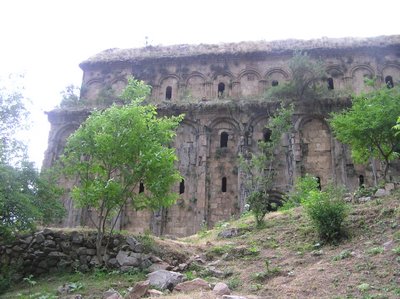 As it was threatening rain, I decided to go on up the hill alone. And perhaps Turan and Belial were tiring of my churches, as they chose to remain in the orchard. Dort Kilisesi sort of sneaks up on you. I was not prepared for the size of the structure. Simple in design, but immense. I entered into the cavernous interior. Dirt has silted up quite a bit on the floor, but the church is still solid, with roof completely intact. Rows of 4-story columns line the interior. The frescoes are fading fast, that, in fact being a major reason I chose to visit here. I took many snapshots, but other than Christ Pantocrator and angels, I was not generally not able to determine who they depicted. Sadly, the old church has also been an obvious and favorite site for teenage graffiti. I lingered for quite a while in the sanctuary, before stepping outside. Of the three churches I had visited in the region--Osk Vank, Barhal and Dort Kilisesi--this was my favorite by far.
As it was threatening rain, I decided to go on up the hill alone. And perhaps Turan and Belial were tiring of my churches, as they chose to remain in the orchard. Dort Kilisesi sort of sneaks up on you. I was not prepared for the size of the structure. Simple in design, but immense. I entered into the cavernous interior. Dirt has silted up quite a bit on the floor, but the church is still solid, with roof completely intact. Rows of 4-story columns line the interior. The frescoes are fading fast, that, in fact being a major reason I chose to visit here. I took many snapshots, but other than Christ Pantocrator and angels, I was not generally not able to determine who they depicted. Sadly, the old church has also been an obvious and favorite site for teenage graffiti. I lingered for quite a while in the sanctuary, before stepping outside. Of the three churches I had visited in the region--Osk Vank, Barhal and Dort Kilisesi--this was my favorite by far. 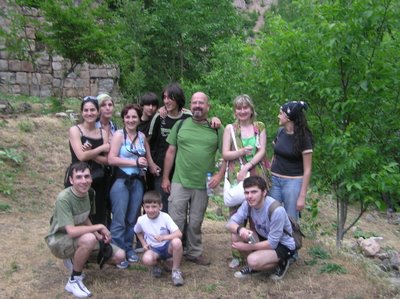 As I stood outside I heard a noise--lots of voices and commotion, in fact, coming from down the hill. I then saw a man approaching the church. I observed him as he slowly crossed himself three times in the unmistakable sweeping movement of the Georgians. My heart lept--the Georgians are here! I approached and tried to make him understand that I too, was Orthodox. I didn't think to show him my cross. Needless to say, we were having trouble communicating--the only word I knew was "madlapt" (sp.), Georgian for "thank you." But we eventually understood each other well enough and shook hands heartedly. The rest of his party had joined us by this time. It seems he was the driver of the minivan we were behind way back in Barhal. The group included 2 female teacher/chaperones and a gaggle of teenagers being taken on a cultural tour of their heritage in what is now Turkey. The young people seemed excited to be there and anxious to see the church and frescoes, once they had finished with their extensive greetings to me. Now I ask you, how many of our teenagers would submit to doing something like this, much less be excited about it? Not many, I fear. We posed for pictures and the one here says it all.
As I stood outside I heard a noise--lots of voices and commotion, in fact, coming from down the hill. I then saw a man approaching the church. I observed him as he slowly crossed himself three times in the unmistakable sweeping movement of the Georgians. My heart lept--the Georgians are here! I approached and tried to make him understand that I too, was Orthodox. I didn't think to show him my cross. Needless to say, we were having trouble communicating--the only word I knew was "madlapt" (sp.), Georgian for "thank you." But we eventually understood each other well enough and shook hands heartedly. The rest of his party had joined us by this time. It seems he was the driver of the minivan we were behind way back in Barhal. The group included 2 female teacher/chaperones and a gaggle of teenagers being taken on a cultural tour of their heritage in what is now Turkey. The young people seemed excited to be there and anxious to see the church and frescoes, once they had finished with their extensive greetings to me. Now I ask you, how many of our teenagers would submit to doing something like this, much less be excited about it? Not many, I fear. We posed for pictures and the one here says it all.I said goodbye to my Georgian friends and brothers and walked back down the hill, and back into Turkey. I did not realize how much I had missed Georgian society in these 11 days. I do not want to engage in any cheap, simplistic Christian triumphalism. But, this incident brought home to me a great truth. We were only a few miles away (as the crow flies) from Georgia proper. But between there and here lay a deep, cultural chasm: the division between a Christian society and the Muslim world. I am still at something at a loss to express it adequately, but the sense of it is as real as anything I have ever experienced. The strictures of the Muslim world, the separation of men and women, and the very presuppositions from which they order their life may not be so obvious at first, until that is, they are contrasted with these curious, lively, noisy, loving, and sometimes untidy Christians. Thank God for the Georgians.
No comments:
Post a Comment